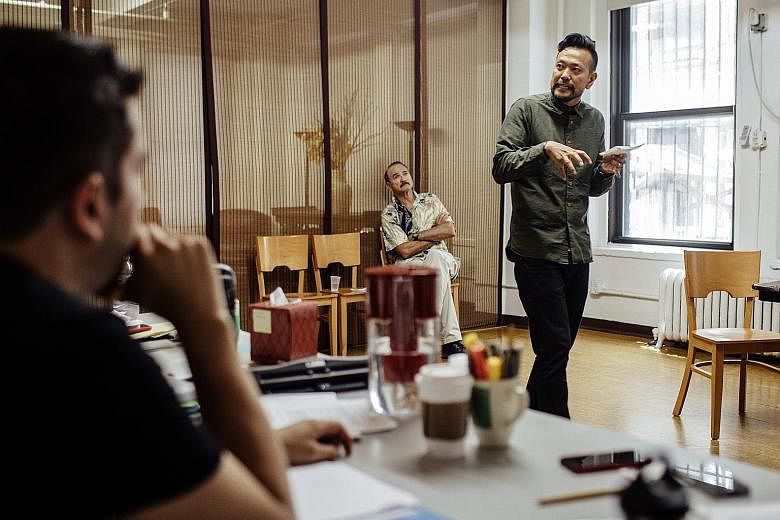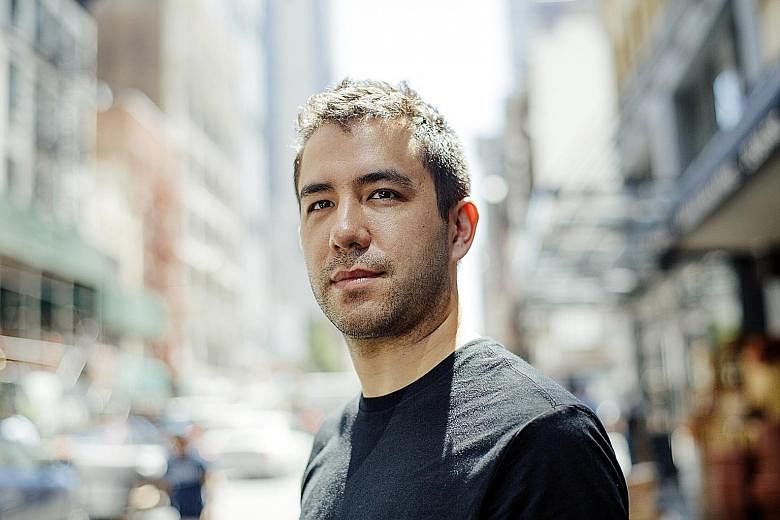NEW YORK • The brouhaha over Mike Daisey, who admitted to fabricating details in his one-man play about Chinese factory workers, The Agony And The Ecstasy Of Steve Jobs, led to a humbling backlash against the acclaimed writer- performer and innumerable essays.
It has also inspired another play: Caught, by San Francisco-born writer Christopher Chen.
Since 2014, Caught has been produced in Philadelphia, Chicago, London and, this spring, Seattle, where The Stranger, an alternative weekly newspaper, named it one of the best plays of the year.
The Play Company is presenting the production's New York debut at La MaMa, where it opens on Sunday.
What fascinated Chen, 34, about the scandal that enveloped Daisey in 2012 was how the debate over artistic licence in documentary theatre took precedence over a more humanitarian concern: the lives of the Foxconn employees who made Apple products, working seven days a week in hazardous conditions that sometimes left them injured or dead.
"We're relieved in a way, to not have to worry about the workers' conditions in China," he said recently during a rehearsal break.
That summation would make Daisey proud.
When reached for a comment, Daisey expressed admiration for Caught, calling it "an intriguing puzzle box of a play".
The two writers spoke for the first time last month.
In person, Chen is boyish-looking, warm and stammers slightly when he speaks, as if he is holding too many important thoughts in his head.
That is reflected in Caught, which is anchored by a number of intersecting themes: the blurry line between truth and fiction, cultural appropriation, Chinese censorship and American views of China.
The play begins even before the audience members sit down. They first walk through an exhibit that culminates with a full-size art installation piece (the Play Company requested that details not be revealed here).
Then, a Chinese artist named Lin Bo (played by Louis Ozawa Changchien) enters and recounts how he was jailed for dissidence.
In a subsequent scene, another Chinese artist, Wang Min (Jennifer Lim), discusses a work of hers that is inspired by Daisey's scandal.
But how do those two events tie together? Are the visual artists based on real people?
To disclose too much would spoil Caught.
But Chen described his initial impulse this way: "I would start with a scene and every single subsequent scene is going to negate the truth of the scene that came before. Then, I started piecing together topics that kind of excited me that could fit into it."
Watching Caught should be like opening up "a Russian doll", according to the play's director Lee Sunday Evans. "It inspires a sense of awe and wonder, of 'Oh my gosh, there's more. There's another layer behind this that I didn't realise,'" she said.
In Caught, Chen also incorporated details from his life.
In 2009, when his play Into The Numbers was being produced in Beijing, the artist, whose first language is Cantonese, travelled to China and visited the 798 Art District, which contained works that were critical of Mao Zedong and the Cultural Revolution.
He then dug deeper into the history of the district and realised that what he had seen was state-sanctioned dissident art, to give the illusion that the government was more tolerant of free speech than it actually was.
"Mao created his reality through an entire country, by sheer force of will and by words," Chen said.
"He created his own truth. So, a continuation of that is still a very real part of China. And 798 is an example of that."
To him, there are similarities between what Mao did and what some United States politicians do, which is to garner support via talking points that are simple to remember, repetitive and yet not completely true.
He cited Republican presidential nominee Donald Trump's comments about China as one example.
"It's such a simple narrative to say that the Chinese government is illegitimate because it's not democratic," he said.
"Therefore, that perception is going to colour everything you see about it. That allows someone like Trump to have a simple narrative - that the Chinese are stealing our jobs or we're in competition with them and so they're a threat."
That kind of talking point obscures the more complicated fact that Chinese factory workers are among those making Trump products.
David Henry Hwang, a Tony Award-winning playwright who has regularly explored Chinese- American relations in his work, said he found Caught to be "smart" when he read the script in 2014.
"I loved it," he said after an event he hosted last month, when he interviewed Chen and the New York cast at the Museum of Chinese in America.
"It helps us, when we are faced with stories and news coming out about China, to be more conscious of the lens through which we're viewing it, our preconceptions and our baggage."
NEW YORK TIMES


